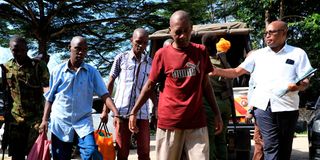Court blocks KNCHR from participating in Shakahola case

Paul Mackenzie (center) and co-accused persons arrive at Shanzu Law Courts in this picture taken on June 21, 2023.
What you need to know:
- The Commission had told the court that its application to join the case was aimed at ensuring that all relevant evidence collected during the investigations is submitted to the court.
- The court has been told that the 66 survivors have been reluctant to corporate with the authority in an exercise that was intended to assist the court.
Survivors of the Shakahola massacre have suffered a setback after the court barred the Kenya National Commission on Human Rights (KNCHR) from taking part in the proceedings.
The State has said that the survivors will now be considered as suspects, and appropriate charges will be preferred against them once investigations into their involvement in the deadly Shakahola fast is finalised.
Shanzu Senior Principal Magistrate Joe Omido has ruled that KNCHR's request to participate in the case as an interested party does not meet the necessary criteria for admission.
“I am convinced that the current application is not meritorious. The commission has not stated the manner or the nature of prejudice that it will suffer if the court does not allow its application to be joined in the proceedings,” said the magistrate
The commission had told the court that its application to join the case was aimed at ensuring that all relevant evidence collected during the investigations is submitted to the court when joined as an interested party, and that this would not be achieved if not admitted.
However, the court noted that such a submission was not tenable since the respondents had not yet been formally charged, and his court does not anticipate receiving any evidence from the parties in the case.
The Commission also argued that the continued detention of the survivors without a charge and the State’s application for their extended detention for a further 180 days is unconstitutional.
The human rights watch had also submitted that the State has shown laxity in the case and therefore, it asked to join the case to provide legal support to see justice administered expeditiously.
“The Commission has been part of the Shakahola tragedy in different capacities such as monitoring the exhumation, postmortems, and taking part in the court cases so we cannot be ignored,” said the Commission through its advocate Annemarie Okutoyi.
The Commission further argued that it ought to be allowed to participate in the proceedings since it had already participated in the various processes related to the Shakahola affairs.
However, the State opposed this, claiming that the Commission had not met the necessary threshold for admission to the case.
Principal Prosecution Counsel Victor Juma and Assistant Director of Public Prosecution Jami Yamina argued that the Commission had not specified any harm it would suffer if it was not allowed to participate in the case.
“The intended interested party has neither alleged not provided reasons for the belief that the submissions it intends to make would be different from those of the primary parties being the state,” said Mr Juma.
Assistant Director of Public Prosecutions Jami Yamina argued that admission of KNCHR in the case would unnecessarily cloud issues for determination in the substantive application where the state seeks more days to detain the survivors
According to the State, the survivor’s behavior has changed and they are now considered suspects in the ongoing investigation.
The court has been told that the 66 survivors have been reluctant to corporate with the authority in an exercise that was intended to assist the court in determining their suitability to be released either pending the outcome of the trial or before being formally charged.
The State has argued that this reluctance raises doubts about their willingness to cooperate with the court and attend trial, suggesting that they may be a flight risk.
The State has applied to extend the custody period of the survivors to allow for the completion of investigations.
The extended detention period will also facilitate the deradicalization of the survivors before their eventual release, once a final decision has been made.





